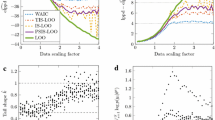Abstract
In this study, the theory of statistical kernel density estimation has been applied for deriving non-parametric kernel prior to the empirical Bayes which frees the Bayesian inference from subjectivity that has worried some statisticians. For comparing the empirical Bayes based on the kernel prior with the fully Bayes based on the informative prior, the mean square error and the mean percentage error for the Weibull model parameters are studied based on these approaches under both symmetric and asymmetric loss functions, via Monte Carlo simulations. The results are quite favorable to the empirical Bayes that provides better estimates and outperforms the fully Bayes for different sample sizes and several values of the true parameters. Finally, a numerical example is given to demonstrate the efficiency of the empirical Bayes.


Similar content being viewed by others
References
Abd-Elrahman AM, Sultan KS (2007) Reliability estimation based on general progressive censored data from the Weibull model: comparison between Bayesian and classical approaches. METRON-Int J Stat 35(2):239–257
Abramson I (1982) On bandwidth variation in kernel estimates: a square root law. Ann Stat 10:1217–1223
Basu AP, Ebrahimi N (1991) Bayesian approach to life testing and reliability estimation using asymmetric loss function. J Stat Plan Inference 29:21–31
Berger JO (1980) Statistical decision theory. Foundations, concepts and methods. Springer, New York
Calabria R, Pulcini G (1994) An engineering approach to Bayes estimation for the Weibull distribution. Microelectron Reliab 34:789–802
Calabria R, Pulcini G (1995) Bayes prediction of number of failures in Weibull samples. Commun Stat Theory Methods 24(2):487–499
Calabria R, Pulcini G (1996) Point estimation under asymmetric loss functions for left-truncated exponential samples. Commun Stat Theory Methods 25(3):585–600
Carter G, Rolph J (1974) Empirical Bayes methods applied to estimating fire alarm probabilities. J Am Stat Assoc 69:880–885
Fay RE, Herriot RA (1979) Estimates of income for small places: an application of James–Stein procedures to census data. J Am Stat Assoc 74:269–277
Ferguson TS (1967) Mathematical statistics: a decision theoretic approach. Academic Press, New York
Guillamon A, Navarro J, Ruiz JM (1998) Kernel density estimation using weighted data. Commun Stat Theory Methods 27(9):2123–2135
Guillamon A, Navarro J, Ruiz JM (1999) A note on kernel estimators for positive valued random variables. Sankhya: Indian J Stat 6(series(A)):276–281
Haque Z, Faizan M (2010) Characterization of the Weibull distribution by conditional variance of generalized order statistics. Pak J Stat 26(3):517–522
Hoadley B (1981) Quality management plan. Bell Syst Tech J 60:215–273
Jones MC (1991) Kernel density estimation for length biased data. Biometerika 78:511–519
Khan MS, Pasha GR, Pasha AH (2007) Reliability and quantile analysis of the Weibull distribution. J Stat 14:32–52
Lawless JF (1982) Statistical models and methods for lifetime data. Wiley, New York
Lei Y (2008) Evaluation of three methods for estimating the Weibull distribution parameters of Chinese pine. J For Sci 54(12):566–571
Nigm AM (1989) An informative Bayesian inference of the Weibull life distribution. Commun Stat Theory Meth 18(3):897–911
Panahi H, Asadi S (2011) Estimation of the Weibull distribution based on type-II censored samples. Appl Math Sci 5(52):2549–2558
Pandey BN, Singh BP, Mishra CS (1996) Bayes estimation of shape parameter of classical Pareto distribution under Linex loss function. Commun Stat Theory Methods 25(12):3125–3145
Rubib D (1981) Using empirical Bayes techniques in the low school validity studies. J Am Stat Assoc 75:801–827
Sahran AM, AL-Ruzaizaa A (2010) Statistical inference in connection with the Weibull model using type-II progressively censored data with random scheme. Pak J Stat 26(1):267–279
Scott DW (1992) Multivariate density estimation. Wiley Interscience, New York
Sinha SK (1986) Bayes estimation of the reliability function and hazard rate of a Weibull failure time distribution. Trabajoe de Estadista 1(2):47–56
Sinha SK, Guttman I (1988) Bayesian analysis of life testing problems involving the Weibull distribution. Commun Stat Theory Methods 17(2):343–356
Terrell GR (1990) The maximal smoothing principle in density estimation. J Am Stat Assoc 85:470–477
Varian HR (1975) A Bayesian approach to real estimate assessment. In: Studies in Bayesian econometrics studies in honor of Leonard J. Savage, North Holand, Amesterdam, pp 195–208
Wu SJ (2002) Estimation of the parameters of the Weibull distribution with progressively censored data. J Jpn Stat Soc 32(2):155–163
Zellner A (1996) A Bayesian estimation and prediction using asymmetric loss function. JASA 81:446–451
Acknowledgments
The author is very grateful to the editor and the anonymous referees for their careful reading, the manuscript, and their constructive comments that improved this work.
Author information
Authors and Affiliations
Corresponding author
Appendix
Appendix
For the scale parameter, \(\beta >0\), we can derive the kernel function estimator as follows:
Here \(Q=(\hat{{\beta }}/\beta )^{\hat{{\alpha }}}\) is pivotal, thus \(W=\ln Q\) and \(v=e^{-w/\hat{{\alpha }}}\) are pivotal quantities and \(H_1 =h_1 /\hat{{\beta }}\).
Similarly for the shape parameter, \(\alpha >0\), we can derive the kernel density estimator as:
where \(Z=\alpha /\hat{{\alpha }}\) and \(H_2 =h_2 /\hat{{\alpha }}\).
Rights and permissions
About this article
Cite this article
Maswadah, M. Empirical Bayes inference for the Weibull model. Comput Stat 28, 2849–2859 (2013). https://doi.org/10.1007/s00180-013-0438-1
Received:
Accepted:
Published:
Issue Date:
DOI: https://doi.org/10.1007/s00180-013-0438-1




